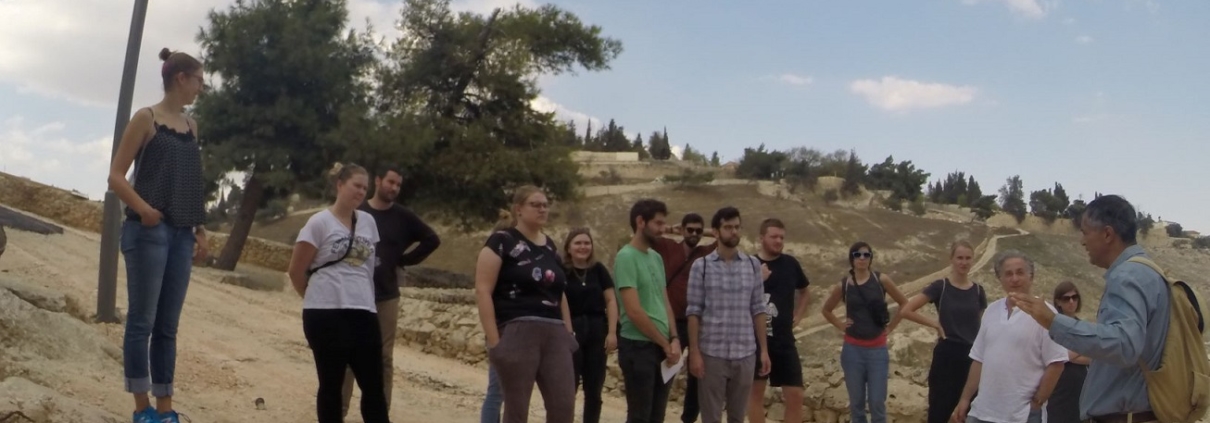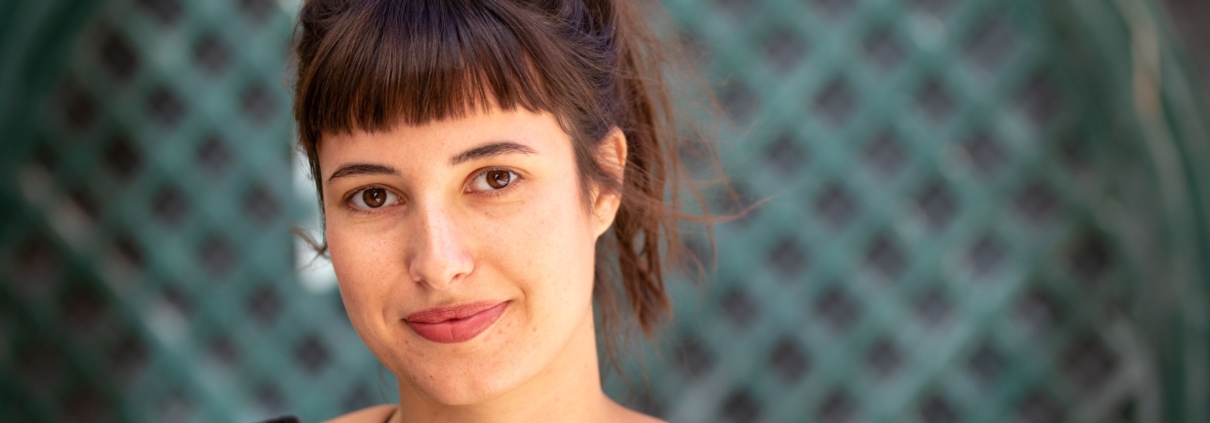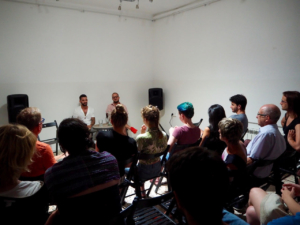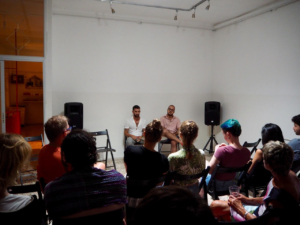Petra Klose, our Social Art Project Coordinator, was invited to Gaza by UNESCO to meet potential partners. In the following text Petra tells about her experience.
When I received the message “You will be leaving for Gaza at 8.30 tomorrow morning“ – I could actually not believe it. I had planned to go to Gaza several times before but every time the trip was cancelled due to security reasons. After the recent bombings and casualties, I couldn’t imagine that it would work out this time. But thanks to our partner, the UNESCO, I was allowed to join a UN car to drive from Jerusalem to Gaza the next morning to do some research for upcoming concerts and music workshops. We had decided to develop a series of jazz performances with local and international musicians, trusting in the power of jazz music in promoting creativity and intercultural dialogue.
Having dealt with all formalities at the Israeli border control, the UN car was allowed to drive through the Erez crossing. Yellow signs showed directions towards “Israel“ and to “Gaza“. What kind country is Gaza? I wondered.
A large, immensely high gate opened ahead of us – and closed behind us. “So this is how it feels when ‘you’re in’, I thought, being aware that it is completely ridiculous to talk about hiding your feelings when you know that you will easily be able to leave in less than 24 hours. On the other side I was met by the UNESCO team who accompanied me to have my papers checked and approved twice more, firstly by officials of the Palestinian Authority and secondly, by representatives of the “de-facto government“ – in other words Hamas, in what looked like a makeshift office in a container on a construction site.
Finally, we were able to drive into Gaza City. I was overwhelmed by the many bright lively colors. I don’t know why I had expected everything to be grey or covered in a thick layer of dust and rubble. In my mind Gaza had always been connected to images of military operations, protests of angry crowds, or most recently reports of the so called “Great March of Return“.
At the UNESCO office I had the chance to meet with Gaza artists for the first time. From an artistic point of view, the encounter was in no way different than any other production meeting for an upcoming music event; talking about the concept, rehearsal schedules, instrument and musical arrangements. Nevertheless, certain things had to be taken into consideration, such as the application of permits for musicians from the Westbank, the coordination for artists from abroad or the procedure to obtain permission for a public event.
After the meeting we looked at potential concert venues. Again, I was surprised to find beach clubs, discos and fully equipped theatres, as well as beautiful hotels with marble floors and fancy swimming pools. The last thing I had expected to find in Gaza were people having fun in a pool. However, on second glance I could see that there were only men and children in the pool. Women sat fully veiled at the pool edge.
Contradictions and contrasts everywhere. On our journey we drove along kilometers of overpopulated shabby dwellings of refugee camps and passed by the ruins of the cultural center which had been bombed a week before my arrival. On the collapsed walls somebody had written in bold red letters the words: “Free Palestine“.
In the end we found the perfect location for our jazz performance. A small archaeological museum and guest house with a breathtakingly beautiful sea view terrace. It looked like the ideal place to connect traditional heritage with a contemporary experimental music performance.
In the museum I discovered in the midst of byzantine columns a big showcase, displays of coins from the Austrian Hungarian Empire which had been excavated in Gaza. At first I thought that my mind was playing tricks on me, but there was in fact the profile of the Empress Maria Theresia right next to other antique coins, mostly from the Roman Empire. As locked up as we think of Gaza today, we forget how this place had always been at the crossroads of different cultures and empires between Africa, Asia and Europe.
At lunch I had a long talk with my companions for the day, among them an energetic young girl from Gaza. We discussed the effects of closed borders on the artist scene. “People here are hungry for the arts. There are more art projects than one would probably expect but we suffer from the restrictions and are denied connections to the outside world in order to exchange new perspectives.“
When I asked her how she feels as a young secular woman going about the internal borders and the religious rules imposed on daily life, she answered that for her “religion is a private matter“. She explained that she can easily accept everyone’s beliefs as an opinion, but requests respect for hers in return. I was curious as to whether she ever wanted to join the protests at the border. „In the beginning it was a movement that came from the people who were really marching for freedom. Later it became affiliated with the government. Why would I follow a government’s call to march for freedom if they would not allow me the freedom to protest against them if I wanted to?“
Our next meeting took place at the Roots Hotel, one of the few places which offer the necessary security clearance for internationals. A small iron plaque beside the entrance caught my eye: “Build by Utopia Design“.
The hotel was extremely comfortable with all technical amenities, only the noise of the generators reminded me of the long electricity cuts in Gaza. The terrace offered the most amazing panorama, to the right a beautiful beach, to the left the port of Gaza City with dozens of fisher boats lined up in the dazzling sun.
I took a picture and sent it to Nadine, a Palestinian friend of mine living in Vienna, who is currently writing a book about her family’s history. She replied „This will be the hippest summer travel destination in 2025“. She wasn’t cynical about it. Nadine represents a mindset that believes in a world in which anything can happen.
In theatre, we use the term „Coup de Theatre“ – an unforeseeable change, a solution which would have been unimaginable only a few pages before.
Even the one who is regarded as the greatest writer of all time, William Shakespeare, used this technique. The best example is in “The Winter’s Tale“. It is admittedly not considered one of his strongest pieces, offering an outrageously unrealistic and depressing plot with an even more outrageously unrealistic happy ending. I want to spare my readers the attempt of even trying to explain its narrative of tragic events and reunions after long-term separation.
The play takes us to the coasts and deserts of the kingdom „Bohemia by the sea“. Being of Czech descent, what always puzzled me was that the historic Kingdom of Bohemia, which roughly corresponds to the modern-day Czech Republic, had neither a coast nor a desert. But the Shakespearean „Bohemia by the sea“ doesn’t correspond to any real country, it’s a purely fictitious kingdom which became a dictum in the world of literature for the projection of a Utopian country.
When I was picked up from the hotel to start my journey back to Jerusalem it felt like driving through a movie with dimmed sound. Maybe it was partly due to the fact that the sandy streets swallow the sound of the cars but it was also evident that there are not many shops or working places open where people would head to during the day.
I sincerely hope that the musicians with whom we are planning our upcoming events will create a soundtrack that matches the incredible range of colors of this place,as an inspiring overture to new rich soundscapes.
What changed as a result of this visit? When I think about Gaza now, I don’t immediately think of groups of angry crowds, I see individual human faces. And it’s not only walls and fences that come to my mind, it’s wide promenades and beautiful sandy beaches.
In a way Gaza became my personal “Bohemia by the Sea“, a high-contrast country, so close and at the same time, so far. All I can hope for as somebody working in the arts, is for some courageous writers who are ready and willing to come up with an inventive storyboard. Of course, any plot for this might seem even more unrealistic than anything Shakespeare has ever written, but if not artists, who would be allowed to dream and create such a utopia to make its audience believe in a happy ending in The Winter’s Tale.
